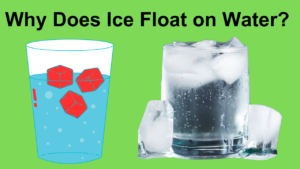When we drop a piece of ice into a glass of water, it starts floating rather than sinking. Now, a question comes into our mind why does ice float on water rather than sink? To get the answer to this question, we can divide this question into two parts. First, why does anything float on water? Secondly, why does anything sink in the water? After getting answers to these questions, we can easily understand the reason behind the floating of ice on the water.
Why Does Anything Sink in the Water?
If we drop anything into the water and it sinks, it means that thing is denser than water. In other words, this thing has a greater mass per unit volume than water. The density of water is 997 kg/m³. If we drop anything into the water whose density is greater than water, it will sink into the water. For example, if we drop a small part of iron into the water, it will sink into the water. Its reason is that iron has a density of 7873 kg/m³. This density of iron is much greater than the density of water.

Why Does Anything Float on Water?
If we drop anything in the water and it floats on the surface of the water, it means that water is denser than that thing. In other words, we can also say that this thing has less mass per unit volume than water. If we drop wood in the water, it will float on the surface of the water. It means that it will not sink. Its reason is that the density of the wood ranges from 320 kg/m³ to 550 kg/m³. On the other hand, the density of water is 997 kg/m³. This difference in density prevents the wood from sinking into the water. Due to this reason, wood floats on the surface of the water.

Why Does Ice Float on Water?
From the above discussion, you can get an idea why does ice float on water. Water has a peculiar behavior than other solids. Its reason is that on cooling, water converts into ice. Its density decreases rather than increases like other solids. Water has a maximum density of 4 degrees centigrade. If we further cool it, at zero degrees centigrade, it converts into ice. As a result, the distance between their molecules increases. The density of ice decreases than the density of water. When we drop ice in the water, it floats on the water. Its reason is that the density of ice is 917 kg/m³ which is less than the density of water 997 kg/m³.

Relevant Posts:
Why Is the Sky Blue but Not Violet?
Peculiar Behavior of Water
It is due to the hydrogen bonding. As we know that a water molecule is made up of one oxygen atom and two hydrogen atoms. One oxygen atom and two hydrogen atoms in a water molecule are strongly attached. They are attached with the help of covalent bonds. Between the positively charged hydrogen atoms and negatively charged oxygen atoms, there are weaker hydrogen bonds. These weaker hydrogen bonds become the cause of the attraction of the water molecules. When we cool water below 4 degrees centigrade, these hydrogen bonds adjust the negatively charged oxygen atoms apart from the positively charged hydrogen atoms. As a result, they form crystals.
Why Does Heavy Water Ice Sink?
Sometimes, we see that ice sinks in the regular water. If you make ice by using heavy water, it will not float on the surface of the water. Its reason is that heavy water ice contains the deuterium isotope of Hydrogen. No doubt, it has Hydrogen bonding but it can’t offset the mass difference between heavy water and regular water. Another fantastic fact is that heavy water ice also sinks in heavy water.
FAQs (Frequently Asked Questions)
1. What Is the Significance of Ice Floating on Water?
It has immense significance for aquatic ecosystems and climate regulation. During the cold seasons, ice forms on the surface of lakes and oceans. This layer acts as an insulating layer. This layer prevents the below water from freezing. It allows aquatic life to survive underneath the ice cover.
2. Does Any Other Substance Exhibit This Behavior?
Water is unique in this aspect. When we freeze other substances, they become denser and sink. On the other hand, water behaves differently. This different behavior is due to hydrogen bonding and specific molecular structure. This property is crucial for aquatic life. It survives during freezing temperatures.
3. Can You Provide an Everyday Example of Ice Floating on Water?
There are various everyday examples of ice floating on water. Anyhow, ice cubes are the best example. They form when water starts to cool down. They float on the surface of the water rather than sinking.
4. Does The Density of Ice Change with Temperature?
Temperature can change the density of ice. When we decrease the temperature, the density of ice will also decrease. That’s why ice forms at colder temperatures. It starts to float on the surface of the water.
5. How Does Ice Melting Affect Sea Levels?
Ice is in the form of a solid. This solid ice turns into liquid water after melting. This liquid water increases the total volume of water in oceans and seas. The polar ice caps and glaciers are melting continuously. Due to this reason, the sea levels are rising. They are creating some concerns for coastal and low-lying areas.
6. What Is the Relationship Between Ice Floating on Water and Global Warming?
Global warming is accelerating the melting process of polar ice caps and glaciers. They are rising sea levels. These accelerations can create some potential disruptions for ecosystems and weather patterns. They can last some adverse impacts on the human settlements in the coastal areas. We should try to overcome these impacts of global warming. For this reason, we have to address the crucial climate change.






3 thoughts on “Why Does Ice Float on Water?”